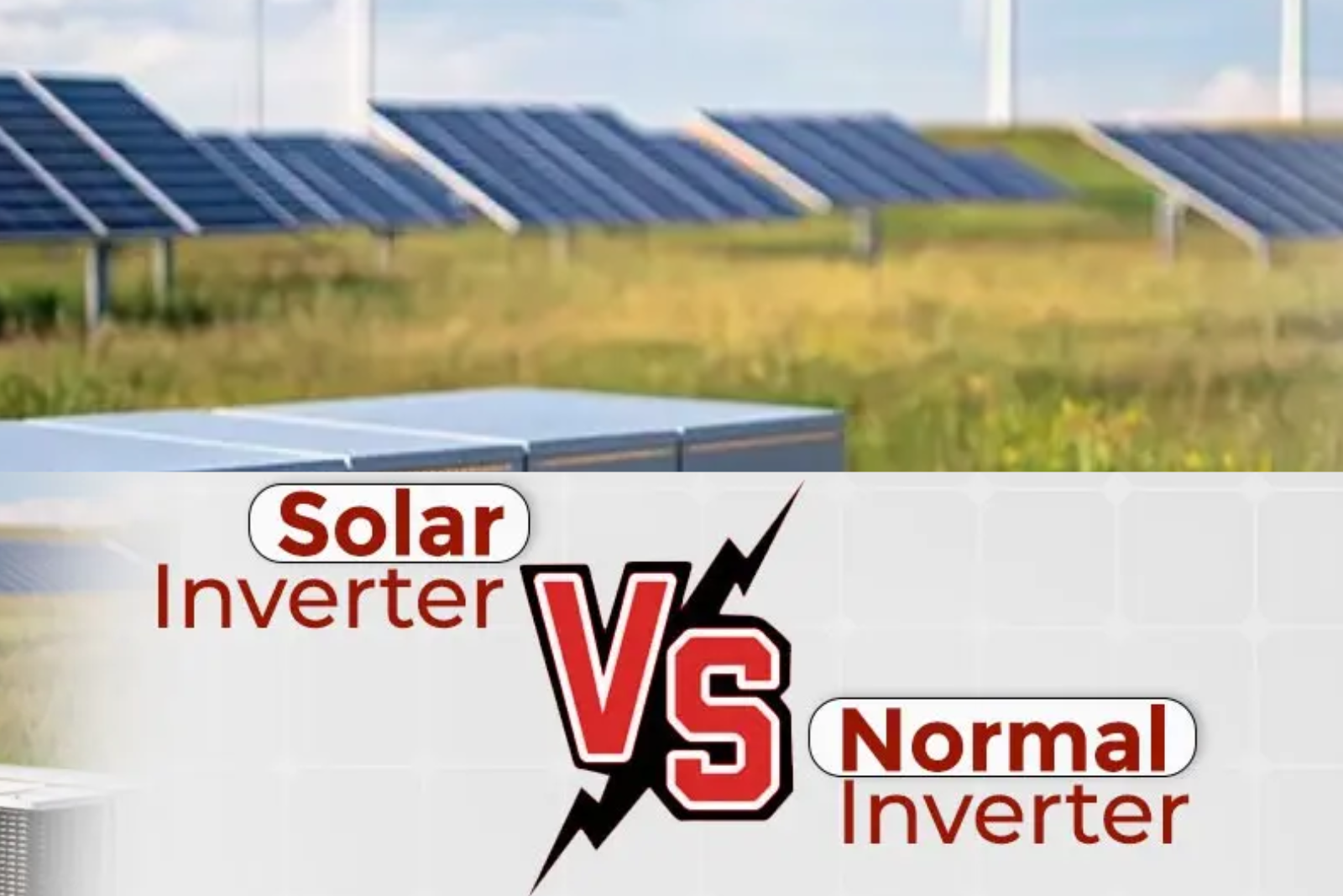Solar Inverter vs Normal Inverter – What’s the Difference?
- Home
- Blogs

In today’s world, where electricity is essential and power cuts are still common in many areas, inverters have become a household need. With solar energy becoming more popular, many people now wonder: should I get a solar inverter or a normal inverter?
Both have their own uses, and the choice depends on what you’re looking for — just backup, or also long-term power savings.
In this blog, we’ll explain the difference between a solar inverter and a normal inverter in the simplest way, so you can decide which one suits your needs better.
What is a Normal Inverter?
A normal inverter, also called a conventional inverter, is a power backup device. It stores electricity from the grid in a battery and uses it during power cuts.
How It Works:
It charges the battery when power is available.
During a power cut, the inverter supplies electricity from the battery to run essential devices.
It’s a common solution in homes, shops, and small offices where short-term backup is needed.
What is a Solar Inverter?
A solar inverter is used in systems that include solar panels. It converts the direct current (DC) produced by solar panels into alternating current (AC) used by your home appliances.
How It Works:
Solar panels generate electricity from sunlight.
The inverter converts it to AC power.
The system can either store the energy in batteries, supply it directly to your home, or send it back to the electricity grid.
Types of Solar Inverters
There are three main types of solar inverters, and each one works slightly differently based on how you plan to use solar power. Choosing the right one depends on whether you want to stay connected to the electricity grid, go completely off-grid, or use both.
1. On-Grid Solar Inverter
Connected to the main electricity supply (grid)
Does not require batteries
Excess power can be sent back to the grid
Reduces monthly power bills
Works only when the grid is available
2. Off-Grid Solar Inverter
Works without a grid connection
Requires batteries to store energy
Suitable for areas with no electricity access
Provides full independence from power cuts
3. Hybrid Solar Inverter
A mix of on-grid and off-grid
Can store power in batteries and send excess to the grid
Offers backup during power cuts and also reduces bills
Ideal for people who want flexibility and long-term savings
Solar Inverter vs Normal Inverter – Key Differences
Feature | Normal Inverter | Solar Inverter |
Power Source | Grid only | Solar + Grid |
Energy Savings | No | Yes |
Use of Sunlight | No | Yes |
Works During Power Cuts | Yes | Yes (with battery) |
Impact on Bills | No impact | Can reduce bills |
Eco-Friendly | No | Yes |
Setup Cost | Lower | Slightly higher (but savings over time) |
When Should You Choose a Normal Inverter?
A normal inverter may be the right choice if:
You live in a city with occasional power cuts
You don’t have rooftop space for solar panels
You only need backup for lights, fans, and small devices
Your budget is limited and you’re not focusing on power savings
When Should You Choose a Solar Inverter?
A solar inverter is a good choice if:
- You have rooftop space with good sunlight
- You want to save on electricity bills
- You live in an area with long or frequent power cuts
- You prefer clean energy and want a long-term solution
- You already have solar panels or plan to install them
Benefits of Solar Inverters Over Normal Inverters
Saves Money on Bills – Solar reduces your electricity use from the grid
Green and Clean – Solar is a renewable energy source
Long-Term Investment – Slightly higher setup cost, but pays back over time
Useful During the Day – Can power appliances in real-time using sunlight
Can Work Independently – Off-grid systems don’t rely on the power company
What to Consider Before Making a Choice
- How much power do you use daily?
- Do you face long or frequent power cuts?
- Is your rooftop suitable for solar panels?
- Are you looking only for backup or also to save on power bills?
- Can you manage an upfront investment for long-term benefits?
Answering these questions will help you decide whether a solar or normal inverter fits your lifestyle better.
FAQs
Q1. Can I upgrade my normal inverter to a solar inverter?
Some inverters can be modified using a solar charge controller. But it’s usually better to install a proper solar inverter system.
Q2. Do solar inverters work on cloudy days?
Yes, but with reduced efficiency. Systems with batteries can store energy for later use.
Q3. Are solar inverters more expensive?
The setup cost is higher, but solar inverters save money in the long run.
Q4. Can I run heavy appliances on both types?
Yes, depending on the inverter’s capacity. Make sure the system is sized correctly.
Q5. What maintenance do inverters need?
Both types require basic checks and battery health monitoring. Solar panels should be cleaned regularly.
Q6. Do I still need a battery with a solar inverter?
For off-grid or hybrid systems, yes. On-grid systems can work without batteries.
Conclusion
Both solar inverters and normal inverters serve different needs. A normal inverter is a simple solution for short-term power backup, while a solar inverter offers backup plus long-term savings, reduced electricity bills, and an eco-friendly lifestyle.
Understanding your energy usage and future plans will help you make the right choice. With the growing shift toward solar energy, many homes and businesses are now choosing solar inverters as a smarter and more sustainable option.
